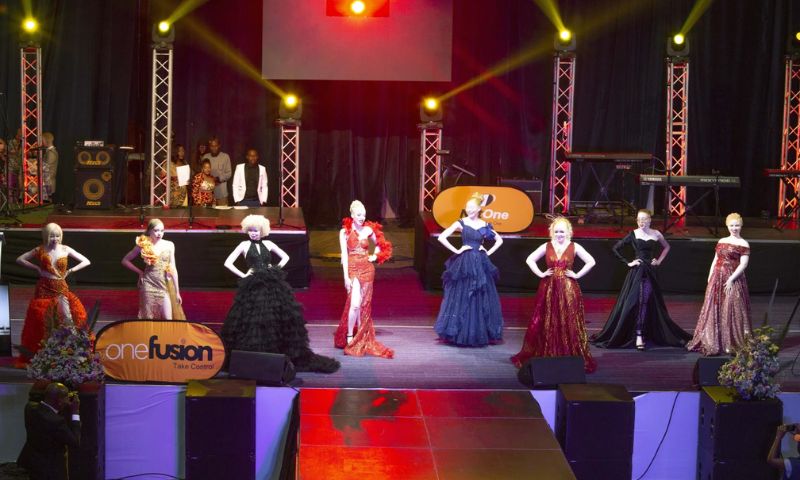HARARE, Zimbabwe: In a moment that radiated with grace and empowerment, Andreia Solange Sicato Muhitu was crowned co-winner of the inaugural Mr. and Miss Albinism Southern Africa pageant.
With a glittering crown adorning her head and a bouquet of flowers clutched in her hands, the 28-year-old Angolan model beamed with pride and purpose. This pageant, held in Zimbabwe’s capital, Harare, marked a significant milestone in her life, one that transcended the traditional beauty competitions she had previously partaken in.
Muhitu, who had competed in beauty pageants since her teenage years and had secured victories in some of them, confessed that this particular pageant felt distinctly special. The reason lay not only in her personal achievement but in the powerful message it conveyed. She shared her aspiration, saying, “I can be that inspiration for young girls, especially those with albinism, to feel comfortable and beautiful in their own skin. That is the strong message we are hoping to send out there.”
Albinism is a genetic condition that diminishes melanin pigment production, resulting in individuals with pale skin, hair, and eyes. They are sensitive to sunlight, often encounter vision problems, and are at a higher risk of skin cancer. Despite its prevalence, albinism remains profoundly misunderstood. Discrimination, ridicule, and even violence fueled by misguided superstitions plague the lives of people with albinism in parts of Africa.
The superstitious beliefs surrounding albinism are disturbing, ranging from the idea that having intercourse with a person with albinism can cure HIV to the belief that their body parts possess supernatural powers. Tragically, in countries like Malawi and Tanzania, individuals with albinism are sometimes killed for their body parts. Even though anti-discrimination laws exist, those with albinism still face daily prejudice, including rejection by their families and denial of paternity.
During the pageant, Muhitu and her fellow contestants shed light on the need for affordable skincare services and cancer treatment, which they often do not receive. Instead, they encounter hate, mockery, and insults. Muhitu herself shared how ridicule at school almost derailed her dreams. However, celebrating her unique skin color has given her the strength to challenge stereotypes and stigma.
Muhitu believes that the pageant she won can be a catalyst for positive change. While the laws on paper may be progressive, the reality on the ground tells a different story. She stated, “It is time for soft power. We can change mindsets through modeling contests, storytelling, music, and any outlets that are interesting. Art forms can be a powerful tool to change mindsets.”
Albinism is more prevalent in sub-Saharan Africa, affecting approximately 1 in 5,000 people. In some regions, such as Zimbabwe and certain southern African ethnic groups, the prevalence can reach 1 in 1,000. This stands in stark contrast to North America and Europe, where the condition is rarer, affecting only 1 in every 17,000 to 20,000 people.
The Mr. and Miss Albinism Southern Africa pageant brought together 18 contestants from various countries, including South Africa, Zambia, Mozambique, Malawi, Angola, and Tanzania. These contestants represented a diverse range of professions, from fashion designers and health workers to professional models.
The event was a platform for the contestants to showcase their talents, not only in traditional beauty categories but also through poetry, song, dance, and insightful responses to questions on social and economic topics. Held under the theme “Into the Light,” the pageant aimed to shine a spotlight on the boundless talents of people with albinism, who often endure harsh treatment and stigma in their communities.
Brenda Mudzimu, the event organizer and founder of the Miss Albinism Trust, which initiated the competition in 2018, emphasized the need to challenge the mental and physical torture that individuals with albinism face. She asserted, “We are mentally and physically tortured, yet we are no different from any other person except skin color.”
The pageant’s contestants were judged based on charisma, confidence, poise, quality of walk, and intellect. Ntandoyenkosi Mnkandla, a 26-year-old trainee paralegal from Zimbabwe, claimed the title of Mr. Albinism Southern Africa.
In addition to the honor of their titles, the winners received cash prizes, trophies, medals, and flowers in various categories, including Miss Personality and the People’s Choice awards. The Mr. and Miss Albinism Southern Africa pageant serves as a beacon of hope, fostering acceptance, understanding, and a celebration of beauty beyond skin deep.


























